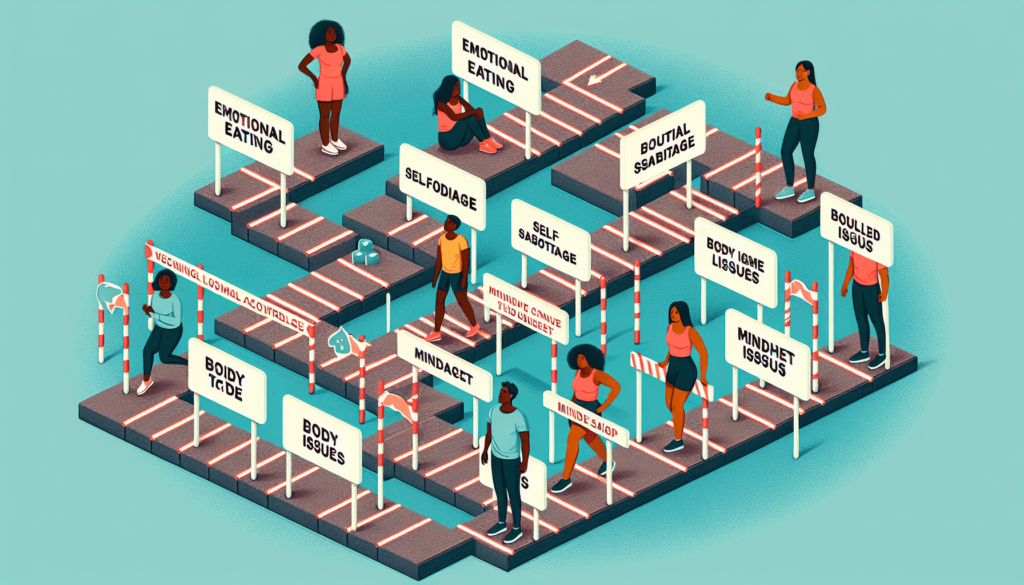Losing weight can be an arduous journey, not just physically, but emotionally as well. The ups and downs, the moments of doubt and temptation, can sometimes feel overwhelming. In this article, we will explore the emotional hurdles that often accompany weight loss and delve into strategies to overcome them. From overcoming emotional eating to building a positive self-image, we will tackle the psychological challenges head-on, helping you find the inner strength to achieve your weight loss goals while nurturing a healthy relationship with yourself. Get ready to conquer the emotional battlefield and emerge stronger than ever before!
In This Article
ToggleUnderstanding Emotional Hurdles in Weight Loss
Losing weight is not just about physical changes; it also involves addressing emotional hurdles that can hinder progress. Recognizing the psychological impact of weight loss is crucial in developing a holistic approach to achieving your goals.
Recognizing the psychological impact of weight loss
Weight loss is not solely a physical journey; it can have a significant psychological impact as well. Many individuals may experience fear, anxiety, and even self-doubt during this process. Understanding and acknowledging these emotions is key to addressing and overcoming them.
Identifying emotional hurdles
In order to overcome emotional hurdles, it is essential to identify them first. Emotional hurdles can range from feelings of low self-esteem, body image issues, to deep-rooted emotional eating habits. By pinpointing the specific emotional challenges you face, you can begin to develop strategies to tackle them head-on.
The mind-body connection in weight loss
The mind and body work in tandem when it comes to weight loss. Our emotions and thoughts can significantly impact our physical well-being and vice versa. It’s important to remember that weight loss is not just about physical transformation but also about cultivating a positive mindset and emotional resilience.
Setting Realistic Expectations
Setting realistic expectations is paramount in ensuring a sustainable and balanced approach to weight loss. It’s essential to address perfectionism and embrace the concept of progress rather than perfection.
Addressing perfectionism
Perfectionism can be a significant obstacle when it comes to weight loss. Striving for perfection can lead to frustration and disappointment, ultimately derailing your progress. Instead, focus on setting realistic and attainable goals that allow room for flexibility and self-compassion.
Understanding the concept of progress, not perfection
Weight loss is a journey, and progress is not always linear. Embrace the concept of progress, not perfection. Celebrate every small win, whether it’s losing a pound or making healthier food choices. Recognize that setbacks are a natural part of the process and use them as learning opportunities, rather than letting them discourage you.
Celebrating small wins
Celebrate your achievements along the way, no matter how small they may seem. Each small win is a step closer to your ultimate goal. Whether it’s fitting into a smaller size jeans or completing a challenging workout, take the time to acknowledge and celebrate your progress. This positive reinforcement will help keep you motivated and boost your confidence.

This image is property of images.pexels.com.
Overcoming Emotional Eating
Emotional eating can be a significant hurdle in weight loss. It’s important to recognize triggers, develop alternative coping mechanisms, and seek professional help if needed.
Recognizing triggers for emotional eating
Emotional eating is eating in response to emotions rather than physical hunger. Identifying the triggers that lead you to reach for food is a crucial step in overcoming this hurdle. Whether it’s stress, boredom, or sadness, understanding your emotional triggers can help you find healthier ways to cope.
Developing alternative coping mechanisms
Instead of turning to food when facing emotional challenges, focus on developing alternative coping mechanisms. Engage in activities that bring you joy and provide a sense of comfort, such as practicing mindfulness, engaging in physical activity, or connecting with loved ones. Finding healthier ways to manage your emotions will help break the cycle of emotional eating.
Seeking professional help if needed
If emotional eating continues to be a significant challenge, consider seeking professional help. A therapist or counselor can provide invaluable support and guidance in identifying the underlying emotional issues that contribute to emotional eating. They can help you develop healthier coping strategies and provide the necessary tools to overcome this hurdle.
Dealing with Self-Sabotage
Self-sabotage can often hinder progress in weight loss journeys. Understanding self-sabotaging behaviors, identifying patterns, and implementing strategies to overcome them is key to moving forward.
Understanding self-sabotaging behaviors
Self-sabotaging behaviors can manifest in various ways, such as procrastination, making excuses, or engaging in negative self-talk. It’s important to recognize and acknowledge these behaviors in order to address and overcome them. Self-awareness is the first step towards positive change.
Identifying patterns of self-sabotage
Identifying the patterns and triggers of self-sabotage is crucial in tackling this hurdle effectively. Reflect on instances when you veer off track or engage in counterproductive behaviors. Look for common themes and situations that tend to trigger self-sabotage. This awareness will help you develop strategies to combat and prevent these patterns from repeating.
Implementing strategies to overcome self-sabotage
Once you have identified self-sabotaging behaviors and patterns, it’s time to implement strategies to overcome them. Develop a plan that includes positive reinforcement, accountability, and support systems. Surround yourself with individuals who encourage and uplift you, and establish clear boundaries to protect yourself from negative influences. Remember, you have the power to break free from self-sabotage and achieve your weight loss goals.

This image is property of images.pexels.com.
Building a Supportive Environment
Creating a supportive environment is crucial in maintaining motivation and consistency in your weight loss journey. Finding a support system, communicating your needs, and cultivating an environment conducive to healthy habits are vital aspects of building a strong foundation.
Finding a support system
Having a support system can make a significant difference in staying motivated and accountable. Seek out friends, family members, or even online communities who share your goals and can provide encouragement and guidance. Having individuals who understand your challenges and help celebrate your successes will make your weight loss journey more fulfilling.
Communicating your needs to loved ones
It’s essential to communicate your needs to your loved ones and those around you. Let them know how they can support you, whether it’s by not offering you unhealthy foods, joining you in physical activities, or simply providing emotional support. Setting clear boundaries and expressing your expectations will help create an environment that fosters your success.
Creating an environment conducive to healthy habits
Environmental factors play a significant role in our habits and behaviors. Modify your environment to support your weight loss goals by making healthy choices readily available. Stock your pantry with nutritious foods, establish a regular exercise routine, and remove any temptations that may hinder your progress. Creating an environment that promotes healthy habits will set you up for success.
Cultivating a Positive Mindset
A positive mindset is key to long-term success in weight loss. Practicing self-compassion, focusing on non-scale victories, and changing negative self-talk to positive affirmations will help nurture a positive mindset.
Practicing self-compassion
Being kind to yourself is crucial throughout your weight loss journey. Treat yourself with the same compassion and understanding you would extend to a loved one. Embrace imperfections and setbacks as part of the process and practice self-compassion when faced with challenges. Remember, you are on this journey to better yourself, both physically and emotionally.
Focusing on non-scale victories
Weight loss is not solely about the number on the scale. Focus on non-scale victories, such as increased stamina, clothes fitting differently, or improved energy levels. Celebrate the positive changes you experience beyond weight loss, as these achievements bolster motivation and confidence.
Changing negative self-talk to positive affirmations
Challenge negative self-talk by replacing it with positive affirmations. Acknowledge and celebrate your strengths, and remind yourself of your capabilities and determination. Surround yourself with positive influences and affirmations that uplift and inspire you. By shifting your mindset, you’ll create a strong foundation for continued success.

This image is property of images.pexels.com.
Managing Stress and Emotional Triggers
Managing stress and emotional triggers is essential in maintaining a healthy mindset and preventing emotional eating. Implementing stress management techniques, identifying emotional triggers, and prioritizing self-care can help you navigate these challenges effectively.
Implementing stress management techniques
Stress can interfere with weight loss progress and lead to emotional eating. Implementing stress management techniques, such as meditation, deep breathing exercises, or engaging in hobbies you enjoy, can help alleviate stress and prevent it from derailing your efforts. Take time to unwind and prioritize self-care to ensure you can manage stress effectively.
Identifying emotional triggers and finding healthy outlets
Identify the emotions and situations that trigger unhealthy eating or emotional responses. Be mindful of these triggers and find alternative, healthy outlets to cope with them. Engage in activities such as journaling, talking to a friend, or engaging in physical activity to channel your emotions in a positive way. By finding healthier ways to address emotional triggers, you’ll break the cycle of emotional eating.
Prioritizing self-care
Taking care of yourself is crucial during your weight loss journey. Prioritize self-care by getting enough sleep, nourishing your body with nutritious foods, and making time for activities that bring you joy and relaxation. Prioritizing self-care will not only benefit your weight loss efforts but also contribute to overall well-being.
Seeking Professional Support
Sometimes, seeking professional support is necessary to overcome emotional hurdles and achieve successful weight loss. Working with a therapist or counselor, joining a weight loss support group, or considering medication or other medical interventions can provide the extra help needed.
Working with a therapist or counselor
A therapist or counselor can provide invaluable support in addressing the underlying emotional issues that contribute to weight gain and hinder weight loss progress. They can help you develop healthy coping mechanisms, provide guidance in overcoming emotional hurdles, and offer a safe space to explore your feelings. Working with a professional can be transformative on your weight loss journey.
Joining a weight loss support group
Connecting with others on a similar weight loss journey can provide an incredible sense of camaraderie and support. Consider joining a weight loss support group where you can share experiences, exchange tips, and find motivation when facing challenges. Being part of a community that understands your struggles can make a world of difference in your motivation and overall success.
Considering medication or other medical interventions
In some cases, medication or other medical interventions may be necessary to address underlying health issues that impact weight loss. Consult with a healthcare professional who specializes in weight management to determine if medication or other interventions are suitable for your specific situation. They can offer expert guidance and ensure your weight loss journey aligns with your overall health needs.

Creating Sustainable Habits
Sustainable habits are crucial for long-term success in weight loss. Focusing on long-term lifestyle changes, setting achievable goals, and finding joy in healthy habits will help you create a sustainable approach.
Focusing on long-term lifestyle changes
Approach weight loss as a long-term commitment to living a healthier lifestyle. Instead of relying on short-term diets or quick fixes, focus on making sustainable changes that you can maintain in the long run. Embrace healthy eating habits, regular physical activity, and other lifestyle modifications that align with your personal preferences and values.
Setting achievable goals
Setting achievable goals is vital to remain motivated and maintain consistency in your weight loss journey. Break down your larger goal into smaller, more attainable milestones. Celebrate each achievement along the way and use them as stepping stones towards your ultimate objective. Setting realistic goals will ensure continued progress and help you stay focused.
Finding joy in healthy habits
Embrace the joy and satisfaction that comes with healthy habits. Discover nutritious foods that you enjoy, explore physical activities that bring you happiness, and incorporate self-care practices that make you feel rejuvenated. By finding joy in these healthy habits, you’ll develop a positive relationship with yourself and the choices you make, leading to sustainable, long-lasting changes.
Celebrating Progress and Maintaining Motivation
Celebrating progress and maintaining motivation is essential throughout your weight loss journey. Reward yourself for milestones, track your progress, and find motivation in non-scale victories to keep the momentum going.
Rewarding yourself for milestones
Acknowledge and reward yourself for reaching significant milestones in your weight loss journey. Treat yourself to non-food rewards such as a massage, a new outfit, or a weekend getaway. Celebrating your achievements reinforces your efforts and reminds you of the progress you’ve made.
Tracking progress
Tracking your progress is a powerful tool for maintaining motivation. Keep a journal, create a visual representation, or use a tracking app to monitor your weight loss, body measurements, or fitness achievements. Seeing tangible evidence of your progress can boost your confidence and provide a sense of accomplishment.
Finding motivation in non-scale victories
While the number on the scale can be a valuable indicator of progress, don’t rely solely on it for motivation. Find inspiration in non-scale victories, such as increased energy, improved sleep quality, or feeling more confident in your appearance. These non-scale victories are often more meaningful and provide a broader perspective on your overall well-being.
In conclusion, understanding and addressing the emotional hurdles that come with weight loss is crucial for long-term success. By setting realistic expectations, overcoming emotional eating, dealing with self-sabotage, building a supportive environment, cultivating a positive mindset, managing stress, seeking professional support when needed, creating sustainable habits, and celebrating progress, you can navigate the emotional challenges of weight loss with resilience and achieve your goals. Remember, your weight loss journey is unique, and progress comes in various forms. Embrace the process, be kind to yourself, and celebrate every step forward on your path to a healthier and happier you.
Related posts:
 Embracing Body Positivity: Overcoming Societal Pressure and Body Shaming
Embracing Body Positivity: Overcoming Societal Pressure and Body Shaming
 Coping with the Emotional Challenges of Living with Diabetes
Coping with the Emotional Challenges of Living with Diabetes
 Overcoming the Stigma: Empowering Women with Diabetes
Overcoming the Stigma: Empowering Women with Diabetes
 Extreme Weight Loss Pills for Men and Women: Hydroxycut Hardcore Elite – Maximum Strength Weight Loss Supplement with Energy Boost and Metabolism Booster – 110 Capsules offered in various package sizes
Extreme Weight Loss Pills for Men and Women: Hydroxycut Hardcore Elite – Maximum Strength Weight Loss Supplement with Energy Boost and Metabolism Booster – 110 Capsules offered in various package sizes
 SlimXcel Keto Gummies: Advanced Weight Loss Formula with Apple Cider Vinegar by Kelly Clarkson (Shark Tank Canada Approved) – Vegan and Keto-Friendly for Effective Weight Loss (60 Gummies)
SlimXcel Keto Gummies: Advanced Weight Loss Formula with Apple Cider Vinegar by Kelly Clarkson (Shark Tank Canada Approved) – Vegan and Keto-Friendly for Effective Weight Loss (60 Gummies)
 Adjustable Magnetic Weighted Bracelet for Lymphatic Drainage and Weight Loss, Hematite Therapy Bracelet for Men and Women, Reduce Swelling and Promote Weight Loss
Adjustable Magnetic Weighted Bracelet for Lymphatic Drainage and Weight Loss, Hematite Therapy Bracelet for Men and Women, Reduce Swelling and Promote Weight Loss











No comment yet, add your voice below!